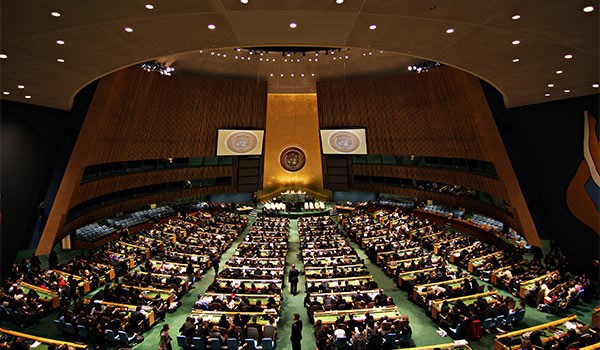
RNA - The world body has failed to address the brazen violations of international law by Saudi Arabia and its Western allies in Yemen. Instead, it continues to bring up irrelevant issues in its latest assessment of the situation surrounding the 2015 Iran nuclear deal following Washington’s withdrawal.
For instance, in a report to the Security Council on Wednesday, UN Under-Secretary-General for Political Affairs Rosemary A. DiCarlo sufficed to say that UN chief Antonio Guterres “deeply regrets this setback” to the nuclear deal, officially called the Joint Comprehensive Plan of Action. Guterres’ deputy, meanwhile, said the UN chief “calls on Iran to consider carefully the concerns expressed by member states about Iranian activities,” including its conventional missile program as well as what is claimed to be Tehran’s arms transfer to Yemeni forces.
That the UN chief should not pay any attention to “baseless and unfounded” claims by third parties is beyond dispute. What’s disturbing is that the UN shamelessly continues to overlook the US’s violation of Resolution 2231 which ratified the nuclear deal.
The UN also continues to overlook the fact that millions of Yemeni civilians are still trapped in their own country, with no access to basic food, water and medicine, a systematic procedure widely described not only as cruel but as inhumane.
The world body is basically at odds with itself. There are no significant negotiations or political processes underway right now by the UN, and with all of this, anti-Yemen sentiment among some UNSC members, that not only is putting human life at stake but denying the Yemeni people the basic right to human dignity, with absolutely no hope in the short and medium term of resolving the unnecessary conflict.
Unfortunately, while most of this suffering is occurring regularly, the UN has also never bothered to put any pressure on the Saudis and their Western allies to stop bombing the besieged port city of Hodeidah, where again millions are trapped, forced to live under constant US-backed, Saudi-led bombardments and blockade.
The terrible situation in Yemen is the impact of violations of international humanitarian law on people, a serious decline of international law and an absence of any leadership by the UN on this major issue. Because of its inaction, and together with certain Western countries, the UN shares the responsibility of challenging conventional thinking about the underlying causes of loss of human dignity, marginalisation and oppression.
If the UN is to prevent further human suffering, it has to stop blaming others for its own failure in Yemen. It has to make some changes. The number one challenge is changing the pro-Saudi and pro-American narrative, which, right now, is toxic. The world body has become used to appeasing the invaders and building walls rather than bridges. Until the UN can change that mentality, people will continue to be abused and have their rights disrespected and violated not just in Yemen but also in Syria and elsewhere in Middle East.
According to Fars News Agancy, the second challenge is the challenge of forcing the Saudis to end their aggression against the poorest country in the Arab world, instead of appeasing them for their money by accusing Iran of sending weapons to Yemen, for which they never provide evidence of any sort.
Lastly, the UN has to learn to address and accept the challenge of allowing the people of Yemen to determine their own fate and political future. They refuse to be occupied and pushed around by outside powers. That’s not a crime. As per the UN Charter, the right to freedom and self-determination is not an issue to be resolved; it is a human reality, as old as humankind. That has to be respected.
As is, stepping onto a brand-new path, fair and unbiased, is difficult, but not more difficult than remaining in an indifferent situation, which is not providing any peace and security to the long-suffering people of Yemen.
847/940